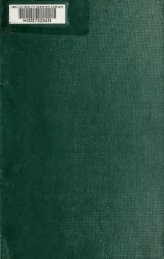The Health bulletin [serial] - University of North Carolina at Chapel Hill
The Health bulletin [serial] - University of North Carolina at Chapel Hill
The Health bulletin [serial] - University of North Carolina at Chapel Hill
Create successful ePaper yourself
Turn your PDF publications into a flip-book with our unique Google optimized e-Paper software.
August. 191. <strong>The</strong> <strong>Health</strong> Bulletin 11<br />
THINGS MISSED WHEN GONE<br />
Youth is the most valuable thing<br />
in the world for one reason, because<br />
it generally means health; but not<br />
one person in a million realizes th<strong>at</strong><br />
it is the most valuable thing in the<br />
world until it is gone and gone forever.<br />
If we could have the experience<br />
and the knowledge and the will<br />
to apply it <strong>at</strong> 25 th<strong>at</strong> we have <strong>at</strong> 50,<br />
it would not take a gener<strong>at</strong>ion to entirely<br />
make over this best <strong>of</strong> all<br />
known worlds to us; and there is no<br />
doubt in the world but th<strong>at</strong> it would<br />
be a better world for all <strong>of</strong> us than<br />
it is now. Doctors are advising periodic<br />
examin<strong>at</strong>ions for the apparently<br />
healthy. Just how closely they are<br />
practicing this themselves is a m<strong>at</strong>ter<br />
for specul<strong>at</strong>ion. Every newspaper<br />
worthy the name, daily and weekly<br />
and monthly magazines, and so on,<br />
has as leading fe<strong>at</strong>ures the personal<br />
health service columns or public<br />
health columns. Even the biggest <strong>of</strong><br />
the New York dailies have their<br />
special articles on health in which<br />
one fe<strong>at</strong>ure after another on health<br />
questions is emphasized. Every associ<strong>at</strong>ion<br />
and meeting, local, township,<br />
county, district, st<strong>at</strong>e, or n<strong>at</strong>ional,<br />
from the "Smoke Shovelers<br />
Union" to the American Medical Associ<strong>at</strong>ion<br />
has its programs liberally<br />
dotted with speeches and or<strong>at</strong>ions and<br />
papers on various subjects rel<strong>at</strong>ed to<br />
health.<br />
But to come right down to bedrock,<br />
how many <strong>of</strong> us think about these<br />
things in terms applicable to our<br />
individual selves It is a well-known<br />
fact th<strong>at</strong> any individual who contempl<strong>at</strong>es<br />
with horror or fear any<br />
serious accident like an automobile<br />
turn-over or a railroad wreck always<br />
pictures such circumstances as coming<br />
with terrific results to everybody<br />
present except to the individual contempl<strong>at</strong>ing<br />
the occurrence. This is<br />
probably one <strong>of</strong> the provisions <strong>of</strong><br />
n<strong>at</strong>ure devised to protect people from<br />
themselves and their own characteristic<br />
worries. It seems th<strong>at</strong> the same<br />
kind <strong>of</strong> disposition, mentally speaking,<br />
<strong>of</strong> course, applies to all <strong>of</strong> us in<br />
this field. We have reasonably good<br />
health. We are able to move along<br />
with our accustomed duties. We get<br />
up in<br />
the morning, e<strong>at</strong> our breakfast<br />
and go to work. So on throughout<br />
the day we are busy with our essential<br />
duties through which we make<br />
a living or amuse ourselves. This<br />
routine goes on from day to day,<br />
week to week, month to month, and<br />
the years follow each other in rapid<br />
succession. This accustomed routine<br />
is only varied occasionally as we vary<br />
our interests in the three cardinal<br />
occup<strong>at</strong>ions <strong>of</strong> mankind—work, love,<br />
and play. Little by little we indulge<br />
in things th<strong>at</strong> we have been told are<br />
not good for our health. We fail to<br />
take enough exercise. We e<strong>at</strong> too<br />
much. We especially e<strong>at</strong> too much<br />
<strong>of</strong> the stuff we should let alone. We<br />
indulge in too much tea and c<strong>of</strong>fee.<br />
We e<strong>at</strong> too much me<strong>at</strong> and heavy<br />
food when we ought to be confining<br />
ourselves mostly to a vegetable and<br />
cereal diet. We neglect our visits<br />
to our dentist. We find it convenient<br />
to leave <strong>of</strong>f our accustomed exercise.<br />
In short, we have a tendency to become<br />
lazy and indolent. <strong>The</strong> majority<br />
<strong>of</strong> us grow too f<strong>at</strong> as a result<br />
<strong>of</strong> such a regime. This adds to the<br />
work put upon the combustion appar<strong>at</strong>us<br />
in our bodies <strong>at</strong> a time when<br />
such machinery should be called on<br />
to do less.<br />
<strong>The</strong> results are inevitable in one<br />
way or another sooner or l<strong>at</strong>er. As<br />
time goes on we find th<strong>at</strong> our bre<strong>at</strong>h<br />
grows shorter upon exertion; th<strong>at</strong> we<br />
find it difficult to keep things going<br />
<strong>at</strong> the same accustomed pace. One<br />
day we wake up and find th<strong>at</strong> we<br />
are not able to get out <strong>of</strong> bed. Our<br />
muscles refuse to move. If we undertake<br />
to force action we are greeted<br />
with a terrific pain th<strong>at</strong> leaves no<br />
doubt as to wh<strong>at</strong> has happened. At


![The Health bulletin [serial] - University of North Carolina at Chapel Hill](https://img.yumpu.com/33495252/241/500x640/the-health-bulletin-serial-university-of-north-carolina-at-chapel-hill.jpg)
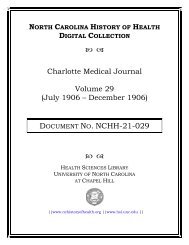
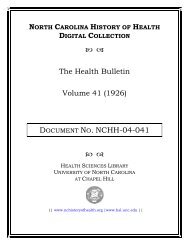
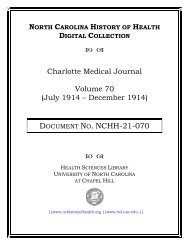
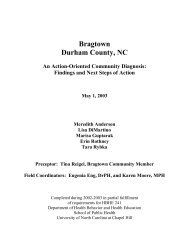
![Bulletin of the North Carolina Board of Health [serial] - University of ...](https://img.yumpu.com/48032016/1/153x260/bulletin-of-the-north-carolina-board-of-health-serial-university-of-.jpg?quality=85)
![The Health bulletin [serial] - University of North Carolina at Chapel Hill](https://img.yumpu.com/47603625/1/169x260/the-health-bulletin-serial-university-of-north-carolina-at-chapel-hill.jpg?quality=85)
![The Health bulletin [serial] - University of North Carolina at Chapel Hill](https://img.yumpu.com/47242858/1/169x260/the-health-bulletin-serial-university-of-north-carolina-at-chapel-hill.jpg?quality=85)
![The Health bulletin [serial] - University of North Carolina at Chapel Hill](https://img.yumpu.com/43204263/1/172x260/the-health-bulletin-serial-university-of-north-carolina-at-chapel-hill.jpg?quality=85)
![The Health bulletin [serial] - University of North Carolina at Chapel Hill](https://img.yumpu.com/41981074/1/163x260/the-health-bulletin-serial-university-of-north-carolina-at-chapel-hill.jpg?quality=85)
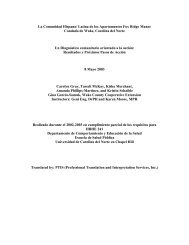
![The Health bulletin [serial] - University of North Carolina at Chapel Hill](https://img.yumpu.com/40912928/1/164x260/the-health-bulletin-serial-university-of-north-carolina-at-chapel-hill.jpg?quality=85)
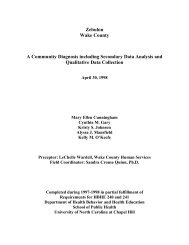
![The Health bulletin [serial] - University of North Carolina at Chapel Hill](https://img.yumpu.com/35643061/1/167x260/the-health-bulletin-serial-university-of-north-carolina-at-chapel-hill.jpg?quality=85)
![Biennial report of the North Carolina State Board of Health [serial]](https://img.yumpu.com/34024350/1/166x260/biennial-report-of-the-north-carolina-state-board-of-health-serial.jpg?quality=85)
